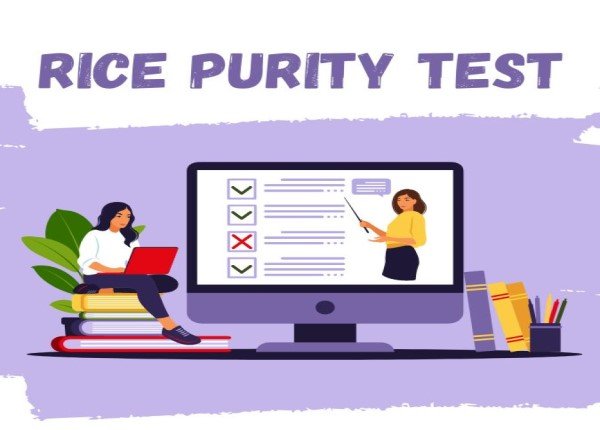The Rice Purity Test has long been a popular tool among young adults, particularly college students, to gauge their life experiences and innocence. Whether you’re curious about your score or looking to understand more about this cultural phenomenon, this guide will provide you with all the information you need to navigate the Rice Purity Test.
What is the Rice Purity Test?
The Rice Purity Test is a self-assessment survey that originated at Rice University in Houston, Texas, during the 1960s. Initially designed to help students bond and share their experiences, the test has since evolved into a widespread social activity. It consists of 100 questions covering a wide range of experiences, including romantic encounters, substance use, and other behaviours that might be considered taboo or risqué.
History and Purpose of the Rice Purity Test
The test was created to foster connections among students by encouraging them to share personal experiences in a lighthearted and non-judgmental way. Over the decades, it has maintained its relevance and popularity, especially among new college students, as a rite of passage. Today, it serves multiple purposes:
- Icebreaker: Helps students bond by sharing and comparing their scores.
- Self-Reflection: Encourages individuals to reflect on their personal experiences and growth.
- Entertainment: Provides a fun and engaging way to explore and discuss personal boundaries and societal norms.
How Does the Rice Purity Test Work?
The test comprises 100 questions, each of which the respondent answers with a “yes” or “no.” Each “yes” response indicates a certain level of experience with the behaviour in question. At the end of the test, the number of “yes” answers is tallied to produce a final score. The higher the score, the more “pure” or innocent the individual is considered to be.
Detailed Breakdown of the Questions
The questions on the Rice Purity Test cover various aspects of life, including:
- Romantic and Sexual Behavior: Questions about holding hands, kissing, sexual activity, etc.
- Substance Use: Inquiries about alcohol consumption, drug use, smoking, etc.
- Legal and Ethical Conduct: Questions about shoplifting, cheating on exams, and other behaviours that may involve moral or legal breaches.
- Personal Experiences: Inquiries about attending parties, travelling, and other life experiences.
Interpreting Your Score
Your Rice Purity Test score is simply a reflection of your life experiences and should not be taken as a measure of your character or worth. Here is a general guideline for interpreting the scores:
- 96-100: Very Pure – Few life experiences outside the norm.
- 90-95: Pure – Some typical life experiences, relatively innocent.
- 85-89: Relatively Pure – Average life experiences, moderate innocence.
- 70-84: Average – A balanced mix of experiences, neither highly innocent nor overly experienced.
- 56-69: Somewhat Experienced – More life experiences, less innocent.
- 41-55: Experienced – Significant life experiences, seen as less innocent.
- 25-40: Very Experienced – Many life experiences, seen as adventurous.
- 0-24: Extremely Experienced – Broad range of life experiences, often considered very adventurous or daring.
The Cultural Impact of the Rice Purity Test
The Rice Purity Test has become more than just a survey; it’s a cultural phenomenon, particularly among college students. It has created a unique subculture where students openly share their scores and experiences, often using them as a basis for discussion and bonding. This cultural aspect has been further amplified by social media platforms, where sharing one’s score can spark conversations and foster connections.
The Rice Purity Test and Social Media
In recent years, the test has seen a resurgence in popularity, especially on platforms like TikTok, Instagram, and Twitter. Young adults take the test and share their scores online, sometimes accompanied by stories or explanations of their answers. This trend has not only kept the test relevant but has also introduced it to new generations.
Criticisms and Controversies
While the Rice Purity Test is generally seen as a fun and harmless activity, it has not been without its criticisms. Some of the critical points of contention include:
- Privacy Concerns: Sharing scores publicly can lead to unintended exposure of personal experiences.
- Pressure and Judgment: Individuals might feel judged based on their scores, leading to peer pressure.
- Cultural Sensitivity: Some questions may not be inclusive or considerate of different cultural backgrounds and values.
Taking the Rice Purity Test: Tips and Advice
If you decide to take the Rice Purity Test, here are some tips to keep in mind:
- Be Honest: Answer the questions truthfully to get an accurate reflection of your experiences.
- Keep It Fun: Remember that the test is meant to be a lighthearted activity.
- Respect Privacy: If you choose to share your score, be mindful of your privacy and the privacy of others.
- Avoid Judgment: Use the test as a tool for self-reflection and bonding, not as a means to judge or compare yourself to others.
The Future of the Rice Purity Test
As long as there are new generations of students and young adults eager to explore and share their experiences, the Rice Purity Test will likely remain a popular and relevant activity. Its ability to adapt to changing social norms and technological advancements ensures that it will continue to be a fun and engaging way for people to connect.
Conclusion
The Rice Purity Test is a unique and enduring tool for self-reflection, entertainment, and social bonding. Whether you score high or low, it’s important to remember that the test is just one way to explore your experiences and connect with others. Embrace your score, use it as a conversation starter, and enjoy the insights it provides into your own life and the lives of those around you.

